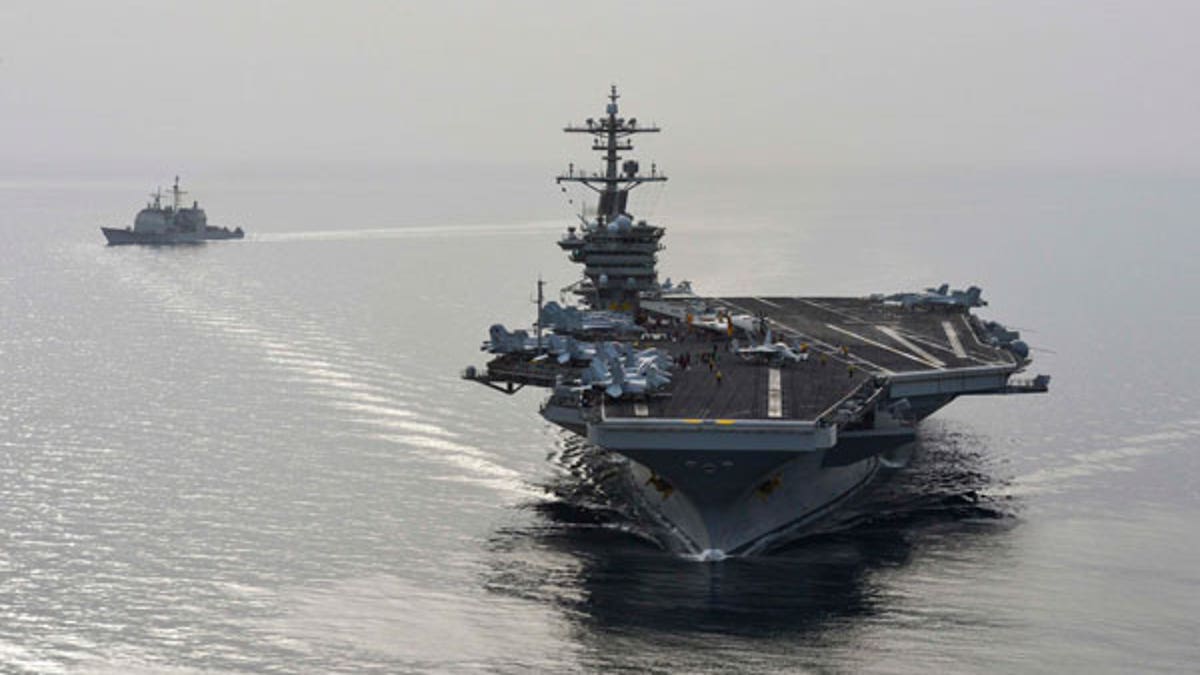
NORFOLK -- A year after Navy aircraft carriers launched an ongoing U.S. air assault against Islamic State fighters in Iraq and Syria, the Navy plans to pull its carrier presence from the Middle East this fall for as long as two months.
That gap -- between when the current carrier leaves the Arabian Gulf and its replacement arrives -- is part of the Navy's effort to regroup after years of what officials say was an unsustainable pace of operations that has worn down resources.
A Navy spokesman said the increased tempo of recent years has been compounded by the impacts of budget cuts and a fleet of 10 carriers instead of 11. That combination means the fleet has been overextending for years without the ability to catch up on maintenance and training, said Lt. Timothy Hawkins, a Navy spokesman at the Pentagon.
"When we responded to increased combatant commander demand for carrier strike groups in 2011, 2012 and 2013, we said we would have to recover our readiness in subsequent years," Hawkins said. This kind of gap between deployments will continue until 2020 to achieve that full readiness, he said.
Hawkins did not specify in which region this gap would occur, saying the Navy does not discuss future operations. But a look at carrier scheduling made clear that the Middle East was the only region where this could happen.
"The only place where they can make that up is the turnover between the (current) carrier and the next one in the Gulf," said retired Vice Adm. Pete Daly, the chief executive officer of the U.S. Naval Institute, who has been watching the carrier deployment schedule closely.
The Navy typically has two carriers deployed at any one time -- one in the Middle East and one in the Pacific. This summer, the carrier George Washington is returning from Japan for its mid-life refueling, while the West Coast-based Ronald Reagan heads out to take its place in the Pacific.
That leaves only the Theodore Roosevelt, which deployed from Norfolk to the Middle East in March and is slated to shift homeports to the West Coast in the fall after seven months at sea. It will be replaced by the carrier Harry S. Truman, based in Norfolk.
The Truman exemplifies some of the problems the Navy is facing with a fleet that hasn't seen much downtime in more than a decade. It was originally set to deploy in 2016. But because the carrier Dwight D. Eisenhower needed to spend more time in the shipyard during its overhaul, the Navy announced last year it would swap the two, and send the Truman out first.
That means the Truman has had its overhaul shortened, and is undergoing a compressed work-up schedule to make it out to the Middle East later this year. It will not make it out to Gulf by the time the Roosevelt is scheduled to depart for home in September, Daly said.
Carriers in recent years have been required to overlap on deployment before the outgoing ship could leave for home, Daly said. Navy leaders have stretched deployments to cover the overlap, which has caused a strain on the ships, aircraft, equipment and sailors, who have spent longer periods out at sea.
By allowing a number of weeks to pass without a carrier in the Gulf, the Navy is easing some of the pressure on the schedule.
Daly warned that with the fleet down a carrier until the Gerald Ford comes online next year and Congress cutting back on defense resources, the fleet's ability to respond quickly is eroding.
Four years ago, the Navy could deploy three carriers with two ready to go on short notice, Daly said. Now, it's having trouble keeping two deployed and one ready, in part because of budget cuts that underfunded maintenance, causing delays that have backed up the system.
"If you approve lower budgets and do so in a disruptive fashion and expect better outcomes, that's madness," Daly said. "So we are reaping what we sowed."
There's no guarantee leaders won't extend the Roosevelt's deployment to fill the gap. But that would only temporarily delay the reckoning that needs to happen, he said.
Meanwhile, Air Force planes can continue to target Islamic State fighters, so not having a carrier in the Mideast does not mean the assault on the Islamic State will come to a halt.
Far more pressing, Daly said, is preparing the Navy to face whatever becomes the next global emergency.
"You can temporarily surge and go to zero gaps and do more with less for short periods of time," he said. "But eventually, that catches up with you."
Rep. Randy Forbes, R-Virginia Beach, said he's concerned about sustaining the U.S. presence overseas.
"Our commanders have been forced to make excruciating choices between keeping our naval forces forward and maintaining the overall health of our fleet," Forbes said.
